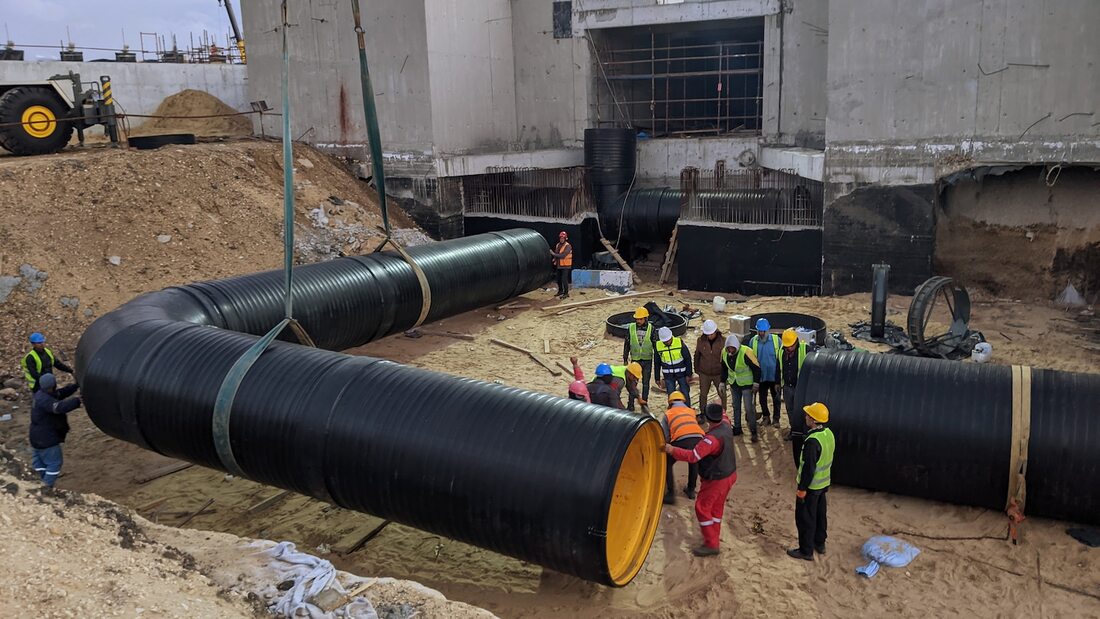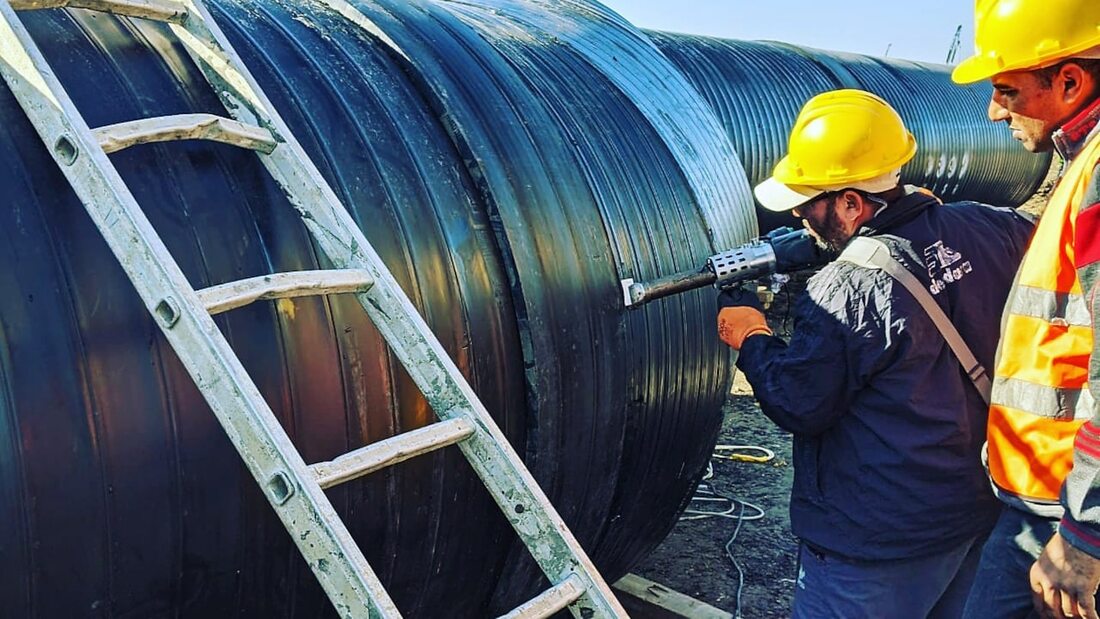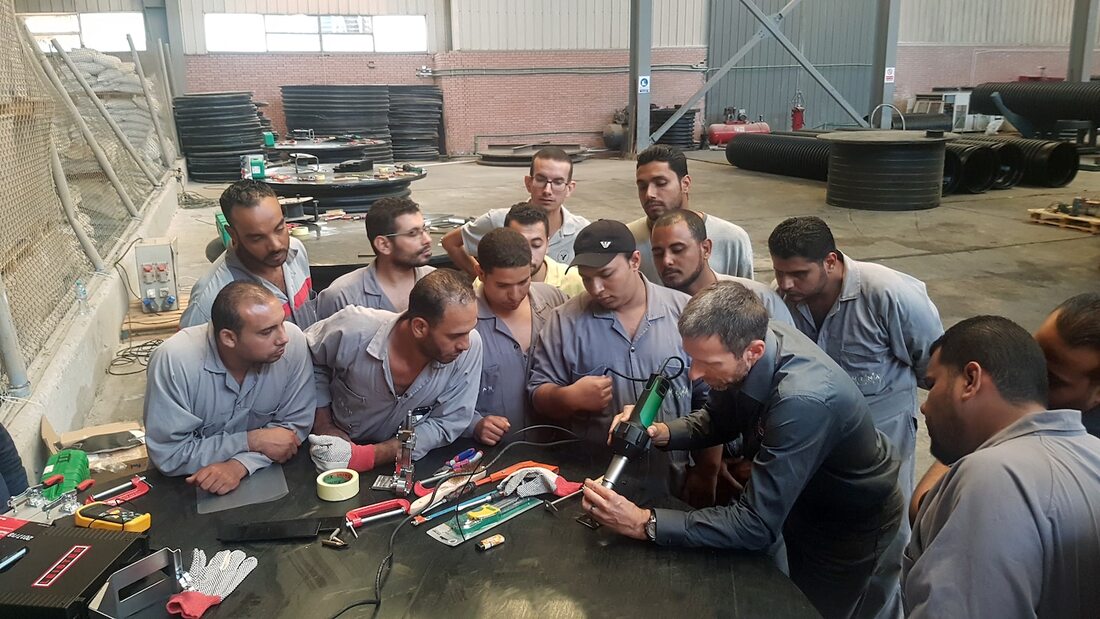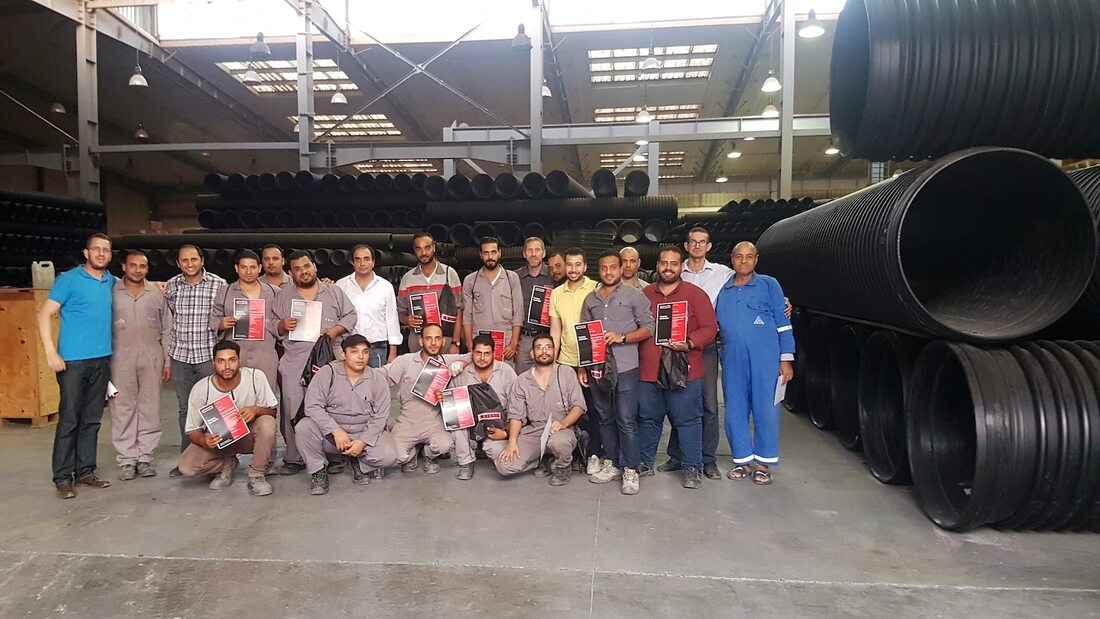|
In Egypt, the largest wastewater treatment plant in Africa, Bahr Al-Baqar, is being built. Due to drought and rapid population growth, there is an urgent need to treat agricultural wastewater and recycle the clean water obtained. In this article, you will learn what equipment from Leister was used in this civil engineering project.
The population in Egypt is growing rapidly: Around 103 million people (and counting) currently live in the land of pyramids and pharaohs. As a dry country, Egypt is dependent on the Nile and groundwater as more than 95 percent of Egypt's water supply is covered by the Nile. However, because the Nile's water is limited and very little groundwater can be reused, the national government is focusing on wastewater treatment projects. Their goals are to purify and reuse the water, thereby saving it, and increasing the country's productivity.
Wastewater Treatment
Although Egypt is already suffering from a water shortage, irrigation is often carried out as it was in ancient times: Farmers submerge large areas of their fields with water. Experts say that far too much water is wasted with the old technology and irrigation methods. This is an important reason to break new ground and use modern technology to improve farmland irrigation. Additionally, irrigation is also threatened by contamination from untreated agricultural, industrial and municipal wastewater.
Bahr Al-Baqar: The Largest Water Treatment Plant in Africa
The Bahr Al-Baqar wastewater treatment plant in northwestern Egypt is set to become the largest in Africa, as well as the largest in the world. The planned capacity of the project is 5 Mio. m3 / 176,57 Mio ft3 of treated water per day (Author's note: 5 Mio. m3 / 176,57 Mio ft3 of water is enough to fill 2,000 Olympic swimming pools). In total, the plant includes four water treatment lines, each with a daily processing capacity of 1.25 Mio. m3 / 44,14 Mio. ft3 of water. The treated water will be used for irrigation of 140'000 ha / 345946 ac of farmland along the Suez Canal. The realization of the project is expected to improve the irrigation of agricultural land.
Welding HDPE Tubes for the Wastewater Treatment Plant
The contract for the production and installation of the spiral-wound PE-100 pipes for the wastewater treatment plant of the large-scale project was awarded to the Egyptian company Krah Misr. Krah Misr was established under license from Krah AG, a German machinery manufacturer. They have more than 35 years of experience in the design, development and construction of production equipment for large-diameter plastic tubes and fittings in all possible sizes and thicknesses. The plastic BorSafe™ HE3490-LS, a classified PE100 plastic, was chosen for the production of the tubes. The advantages of PE100 plastic for this application are low installation and maintenance costs resulting from its resistance to corrosion and chemicals. Among many other advantages, such plastic tubing has excellent flow properties, high operational reliability and, due to its smooth and non-porous surface, a low tendency to foul.
2.7 km / 1.7 mi of PE Tubes with Diameter of 1.6–2.5 m / 5.3–8.2 ft Welded in Record Time
Krah Misr supplied and installed a total of 2.7 km / 1.7 mi of spiral-wound PE 100 tubes from 1.6–2.5 m / 5.3–8.2 ft) in diameter for the wastewater treatment plant. Originally, it was expected to take 18 months to complete this project. However, these low-pressure application tubes (2.2 bar / 220000 Pa) were laid and welded on site in record time (seven months) by Krah Misr.
Due to the nature of the ground, extrusion welding was required in addition to electrofusion welding
The 6 m / 19.7 ft long tubes were welded together to ensure tightness, stability and resistance to leaks.
In order to finish the project in seven months, Krah Misr doubled the number welders and used a total of 24 Leister extruders.
Leister's FUSION 3 and FUSION 3C extruders are the favorite extruders of Krah Misr's welders. Several reasons for this are given: The welders know the extruders very well since they have already been working with them for several years. In addition, the robust Leister extruders are specifically designed for work in large plastic tubes.
Leister's Egyptian distributor, SHS Saad Hanna Sons, has been supplying extruders to Krah Misr for years. In addition to distribution, SHS also offers maintenance and repair for all Leister machines and tools. The repair technicians at SHS know how important the quality of Leister products is because they are used for important infrastructure projects in the country and must function reliably even under difficult conditions.
Atef Hanna, Managing Director of SHS Saad Hanna Sons, said: "It was a challenge delivering a large number of extruders to Krah Misr in the very first week of the new year (2021). Despite the vacation season and Covid situation, Leister did the impossible and delivered the extruders in record time. My team made sure that the customs clearance and release of this important shipment went smoothly. We wanted to do everything we could to ensure that Krah Misr could continue without interrupting the project. After all, Krah Misr is one of our most important customers and we always strive to provide the best service to our customers." Following the successful completion of the project at the end of April 2021, Peter Youssef, General Manager of Krah Misr, said: "As a pioneer in the production of large, spiral HDPE tubes in Egypt, Krah Misr is very happy with the excellent service provided by Leister. The quality of the Swiss-made Leister tools and the local service from SHS have pleased us greatly. Our employees, the first-class service by our business partners and the high quality of the equipment used are all significant keys to success for us."
Author: Silke Landtwing, Manager Corporate Communications, Leister Switzerland
WEBSITE KRAH MISR WEBSITE KRAH AG LEISTER DISTRIBUTOR IN EGYPT Comments are closed.
|
|
STANMECH Technologies Inc.
944 Zelco Drive Burlington ON L7L 4Y3 | 1-888-438-6324 | [email protected] Terms of Use Privacy Terms and Conditions of Sale Warranty Policy |
|
Proud Member of:





